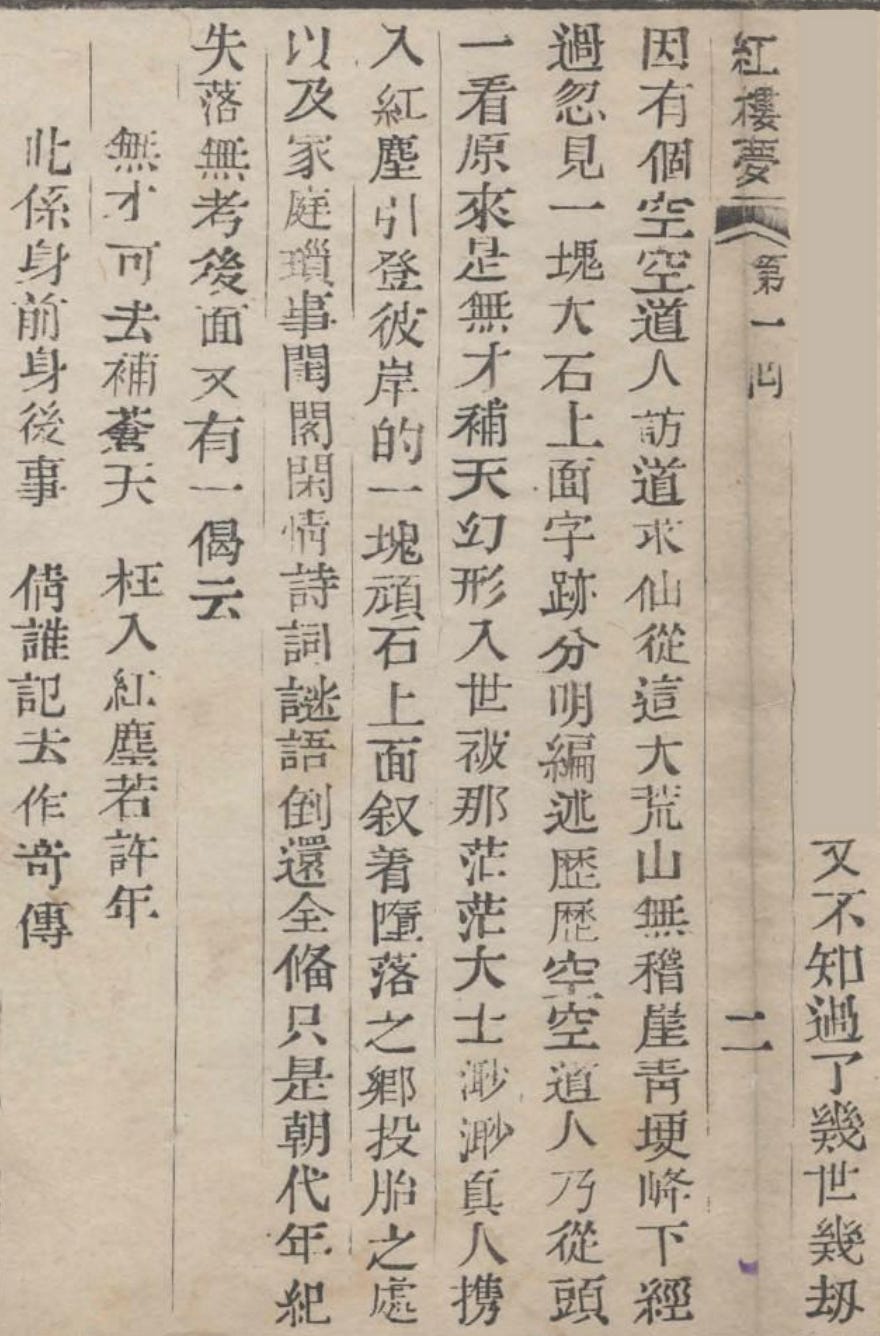Back To The Ending
Another Taoist priest discovers the stone — this time at the end of its journey. This passage contains a brief description of the story itself, as well as the first proper poem in the entire novel. It’s not entirely clear why we’re jumping around in time like this — but, as you’ll soon realize, the linear concept of time isn’t really important at this point.
Chinese Text

又不知過了幾世幾劫,因有個空空道人訪道求仙,從這大荒山無稽崖青埂峰下經過,忽見一塊大石,上面字跡分明,編述歷歷。空空道人乃從頭一看,原來是無才補天,幻形入世,被那茫茫大士渺渺真人攜入紅塵,引登彼岸的一塊頑石。上面敘著墮落之鄉,投胎之處,以及家庭瑣事,閨閣閒情,詩詞謎語,倒還全備,只是朝代年紀失落無考。後面又有一偈云:
無才可去補蒼天,枉入紅塵若許年。此係身前身後事,請誰記去作奇傳?
Translation Notes
茫茫大士渺渺真人 – the Vast Master and the Ethereal Sage. 茫茫 signifies something big or vast; 渺渺 is something elusive or far off. Both are adjectives clearly rooted in Taoist imagery. Meanwhile, 大士 is the term for a Bodhisattva (i.e. a person on the path towards becoming the Buddha), and 真人 is a Zhuangzi term meaning “a Taoist spiritual master.” The overall idea gives you a feeling for the mix of Buddhist and Taoist influences that we saw in the last translated passage.
紅塵, “the red dust,” refers to this world. It’s easiest to remember through the idiom 看破紅塵, or “to see through the vanity of the world” – i.e to attain enlightenment.
彼岸, literally “the other bank of the river,” is the Chinese equivalent of पारमिता or paramita. It refers to the perfection of a virtue, or a goal to be reached. In this sentence, the stubborn stone (一塊頑石) enters the mortal world in mortal form (幻形入世) and is led by投胎 the Vast Master and Ethereal Sage through this world (攜入紅塵) on to eventual enlightenment (引登彼岸).
投胎 means “to be reincarnated.”
Translation Critique
Hawkes
Hawkes loves looking for Latin-based equivalents of the Chinese names. Thus, 空空道人 turns into Vanitas (from Latin vānitās: emptiness, nothingness, vanity, falseness, etc), 茫茫大士 becomes Impervioso (from Latin impervius: impassable, impervious), and 渺渺真人 becomes Mysterioso (from Latin mystērium – mystery or secret). Interestingly, Hawkes does refer to Impervioso as a mahāsattva (महासत्त्व – “great creature, great being,” here a bodhisattva who attains a high degree on the path of consciousness awakening), and calls Impervioso an “illuminate” (i.e. enlightened when used as an adjective).
In my opinion, the combination of Sanskrit adjectives and Latin names makes for a confusing bunch of mumbo jumbo. There’s no reason to translate these names into foreign languages, since they make perfect sense in Chinese as they are. We’ll see many more examples of Hawkes’ use and misuse of names as we go along.
Keep reading with a 7-day free trial
Subscribe to Dream of the Red Chamber to keep reading this post and get 7 days of free access to the full post archives.




